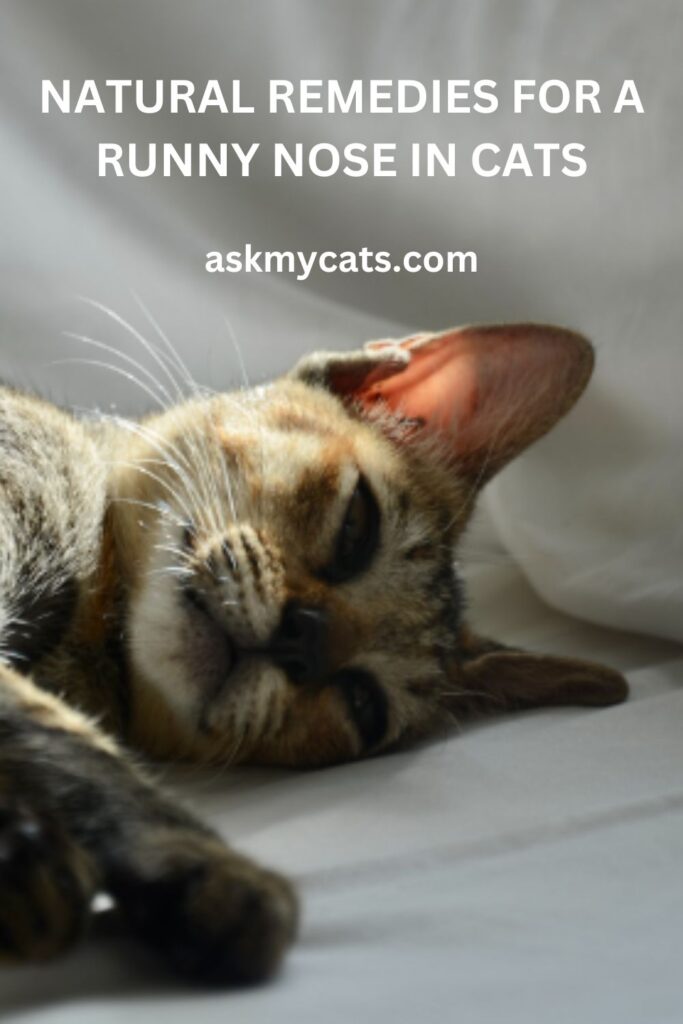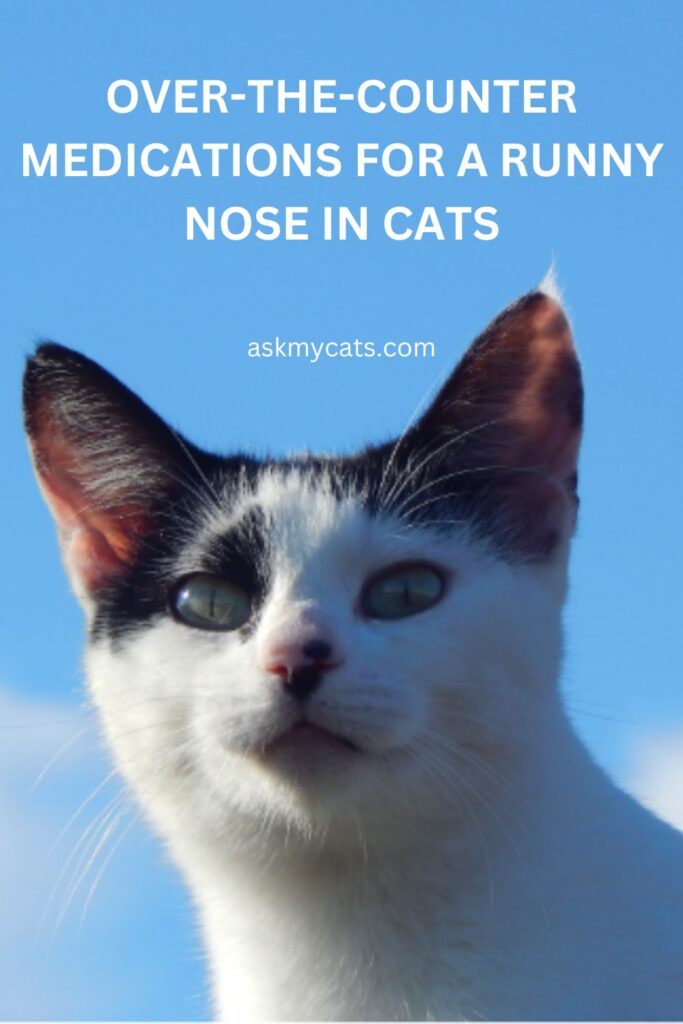As a cat owner, it’s always concerning to see your furry friend suffering from a runny nose. A runny nose in cats can be caused by a variety of factors, including allergies, infections, and even foreign objects stuck in their nostrils.
While it’s always best to seek veterinary care if your cat’s runny nose persists, there are also several home remedies that you can try to alleviate their symptoms.
In this article, we’ll explore some of the most effective and natural ways to cure your cat’s runny nose from the comfort of your own home.
Key Takeaways
- Runny nose in cats can be caused by allergies, infections, or foreign objects stuck in their nostrils.
- Home remedies for a cat’s runny nose include using a saline solution to flush the nose, steam therapy, honey for its antibacterial properties, and warm compresses to reduce inflammation.
- Over-the-counter medications like antihistamines and decongestants may be used with veterinarian consultation, as some can be toxic to cats.
- Maintaining good home hygiene, including keeping litter boxes clean, vacuuming frequently, and washing bedding regularly, can help prevent respiratory issues in cats.
- Providing a balanced diet, plenty of water, and immune-boosting supplements like vitamin C and probiotics can support a cat’s immune system and aid in recovery.
- Essential oils should be used with caution and only with veterinarian approval, as some can be toxic to cats and cause adverse reactions.


Give Your Cat the Perfect Day
Get the Free Ebook!
Natural Remedies For A Runny Nose In Cats

As a cat owner, I understand the concern and worry that comes with seeing our furry friends suffer from a runny nose.
Cats, just like humans, can experience nasal congestion and discharge due to various reasons such as upper respiratory infections, allergies, foreign bodies, or underlying health conditions.
While consulting with a veterinarian is always the best course of action, there are some home remedies that can help alleviate mild symptoms of cat runny nose.
Here, I will share some effective home remedies that I have personally used to help my cat find relief from a runny nose. Please refer to the table below for a handy reference of these remedies and their descriptions.
| Remedies | Description |
|---|---|
| Steam Inhalation | Place your cat in a bathroom with a hot shower running to create steam. The steam can help to relieve congestion and reduce nasal discharge. |
| Saline Solution Drops | Place your cat in a bathroom with a hot shower running to create steam. Steam can help to relieve congestion and reduce nasal discharge. |
| Humidifier | Using a humidifier in the room where your cat spends most of its time can add moisture to the air and help to reduce nasal congestion. |
| Honey | Honey has natural antibacterial and anti-inflammatory properties. Adding a small amount to your cat’s food can help soothe its runny nose. |
| Warm compress | Placing a warm compress on your cat’s nose can help reduce inflammation and relieve discomfort. |
| Nutritional Supplements | Adding immune-boosting supplements such as vitamin C, vitamin E, and omega-3 fatty acids to your cat’s diet can help to improve its overall immune system and reduce the severity of upper respiratory symptoms. |
| Clearing Nasal Discharge | Using a soft, moist cloth or cotton ball, gently wipe away any visible nasal discharge from your cat’s nostrils. Be careful not to irritate the nasal passages further. |
| Ensuring Hydration | Make sure your cat has access to clean, fresh water at all times to help keep it hydrated. Hydration is important for maintaining healthy nasal passages and preventing dryness or irritation. |
| Reducing Environmental Allergens | Keep your cat’s environment clean and free of potential allergens, such as dust, smoke, and mold. Regularly vacuum your home, wash your cat’s bedding, and use an air purifier to reduce the presence of allergens in the air. |
| Consultation with Vet | If your cat’s runny nose persists or is accompanied by other symptoms, it’s important to consult with a veterinarian for proper diagnosis and treatment. Home remedies may not be suitable for all cats, and a vet can provide appropriate medical advice. |
Important Note:
It’s important to mention that while these home remedies can help alleviate mild symptoms of cat runny nose, it’s always best to consult with a veterinarian for proper diagnosis and treatment, especially if the condition persists or is accompanied by other symptoms.
A vet can determine the underlying cause of the runny nose and provide tailored treatment for your cat’s specific condition.
Home remedies should be used with caution and under the guidance of a veterinarian to ensure the safety and well-being of your feline friend.
Must Read: Runny Cat Nose: Causes, Symptoms, and Remedies
Over-The-Counter Medications For A Runny Nose In Cats

There are some over-the-counter (OTC) medications that are sometimes used to treat runny noses in cats. These include:
- Antihistamines: These medications may be used if your cat’s runny nose is caused by allergies. However, not all antihistamines are safe for cats, so it’s important to consult with a veterinarian before administering any medication.
- Decongestants: Decongestants may be used to relieve nasal congestion in cats, but again, it’s important to consult with a veterinarian before giving your cat any medication.
- Vaporizers: Vaporizers that release essential oils, such as eucalyptus or peppermint, may help to clear your cat’s nasal passages. However, some essential oils can be toxic to cats, so it’s important to use caution before using any essential oils around your cat.
Remember, it’s always best to seek veterinary care before administering any medication to your cat, as they can have different sensitivities and reactions to medications than humans do.
Interesting Read: Cat Nasal Congestion: Unblocking the Sniffles
Home Hygiene Tips To Prevent A Runny Nose In Cats
Maintaining good home hygiene is important in preventing a runny nose in cats. Here are some tips to keep your home clean and healthy for your feline friend:
- Keep litter boxes clean: Clean your cat’s litter box regularly to prevent the build-up of bacteria and viruses that can lead to respiratory infections.
- Vacuum frequently: Vacuuming your home frequently can help remove dust and other irritants that may cause your cat to have a runny nose.
- Wash bedding regularly: Wash your cat’s bedding regularly to remove any allergens, dust, and dirt that may accumulate over time.
- Keep your home well-ventilated: Good air circulation can help prevent the build-up of mold, dust, and other allergens that can irritate your cat’s respiratory system.
- Keep household cleaners and chemicals out of reach: Many household cleaners and chemicals can be toxic to cats, so it’s important to keep them stored in a safe place where your cat can’t access them.
By following these home hygiene tips, you can help prevent your cat from developing a runny nose and other respiratory issues.
Remember to also provide your cat with a healthy diet, plenty of water, and regular exercise to maintain its overall health and well-being.
Interesting Read: Why Does My Cat Have A Dry Nose? Causes and Remedies
Nutritional Considerations For A Cat With A Runny Nose
When a cat has a runny nose, proper nutrition can help support its immune system and aid in recovery. Here are some nutritional considerations to keep in mind:
- Provide plenty of water: It’s important to keep your cat hydrated, especially when they have a runny nose. Make sure they always have access to fresh water and consider adding a water fountain to encourage them to drink more.
- Feed a balanced diet: A balanced diet that meets your cat’s nutritional needs can help support its immune system and aid in recovery. Consider feeding a high-quality commercial cat food or working with a veterinarian to create a balanced homemade diet.
- Include immune-boosting supplements: Supplements such as vitamin C and probiotics may help support your cat’s immune system and aid in recovery. However, it’s important to consult with a veterinarian before adding any supplements to your cat’s diet.
- Avoid allergens: If your cat’s runny nose is caused by allergies, it’s important to identify and avoid any allergens in their diet. This may include certain proteins or ingredients commonly found in commercial cat foods.
Must Read: Effective Home Remedies for Cat Nasal Congestion
Essential Oils For A Cat’s Runny Nose

It’s important to consult with a veterinarian before using any essential oils on or around your cat, even for decongestion.
While some essential oils may have beneficial properties, essential oils can be toxic to cats and cause adverse reactions, including respiratory issues, digestive upset, and even liver damage.
In general, it’s best to avoid using essential oils on or around your cat and focus on other methods for relieving nasal congestion, such as using a humidifier, keeping your cat’s environment clean, and providing plenty of water.
If your cat is experiencing persistent nasal congestion or other respiratory issues, it’s important to seek veterinary care to determine the underlying cause and appropriate treatment.
Must Read: How To Clean A Cat’s Nose? Safely and Effectively!
When to Seek Veterinary Care For Runny Nose In Cats
| Signs and Symptoms | Description |
|---|---|
| Persistent nasal discharge | If your cat’s runny nose persists for more than a few days, or if the nasal discharge becomes thick, discolored, or foul-smelling, it may indicate a more serious underlying condition that requires veterinary attention. |
| Sneezing | Frequent or violent sneezing, along with nasal discharge, can be a sign of a more severe respiratory infection or other respiratory issues in cats, and should prompt a visit to the vet. |
| Difficulty breathing | If your cat is struggling to breathe, breathing rapidly, or showing signs of respiratory distress, such as open-mouthed breathing, it may indicate a severe respiratory issue that requires immediate veterinary care. |
| Loss of appetite | Cats with runny noses may experience a loss of appetite, which can lead to dehydration and other health complications. If your cat is not eating or drinking normally, it’s important to consult with a vet for evaluation and management. |
| Other accompanying symptoms | If your cat is exhibiting other signs of illness, such as lethargy, fever, coughing, or discharge from eyes or ears, it may indicate a more complex health issue that requires veterinary care. Prompt medical attention is necessary to ensure proper diagnosis and treatment. |
The Importance Of A Vet Check-up
Regular veterinary check-ups are important for maintaining your cat’s overall health and well-being, as well as detecting and treating any health issues early on.
When it comes to a runny nose in cats, a vet check-up is especially important to determine the underlying cause of the symptoms and provide appropriate treatment.
During a veterinary check-up, the vet will perform a physical examination of your cat and may recommend additional tests, such as blood work or x-rays, to help diagnose the cause of your cat’s runny nose.
Depending on the underlying cause, treatment may include antibiotics, antiviral medications, or other medications to help relieve symptoms.
In addition to providing treatment for your cat’s runny nose, a veterinary check-up can also help identify any other health issues that may be impacting your cat’s overall health and well-being.
Regular check-ups can help ensure that your cat receives preventative care, such as vaccinations and parasite control, and can help detect and treat any health issues early on before they become more serious.
Interesting Read: Why Do Cats Have Wet Noses?
Frequently Asked Questions
Can I use essential oils to treat my cat’s runny nose?
No, it’s not recommended to use essential oils for cats, as they can be toxic and cause adverse reactions.
How can I prevent my cat from developing a runny nose?
Maintain good home hygiene, provide a healthy diet, and keep your cat’s environment free of irritants.
When should I take my cat to the vet for a runny nose?
If your cat has a persistent runny nose or other respiratory symptoms, it’s important to take them to the vet for an examination and appropriate treatment.
Can a cat’s diet affect its respiratory health?
Yes, a healthy diet can help boost your cat’s immune system and promote respiratory health.
Can stress cause a cat’s runny nose?
Yes, stress can weaken a cat’s immune system and make them more susceptible to respiratory infections.
Final Words
A runny nose in cats can be caused by a variety of factors, from allergies and infections to stress and poor diet.
While some cases of a runny nose in cats can be treated at home with proper care and hygiene, it’s important to seek veterinary care if your cat has persistent symptoms or if you suspect an underlying health issue.
By providing regular veterinary care, maintaining good home hygiene, and providing a healthy diet, you can help promote your cat’s respiratory health and overall well-being.
Must Read: How To Make A Cat Sneeze To Clear Nose?
